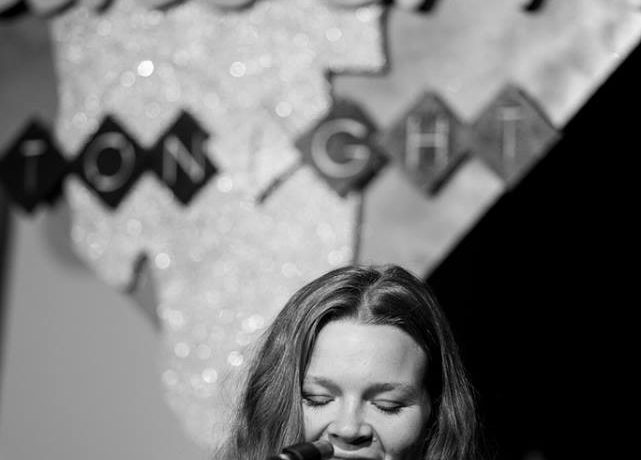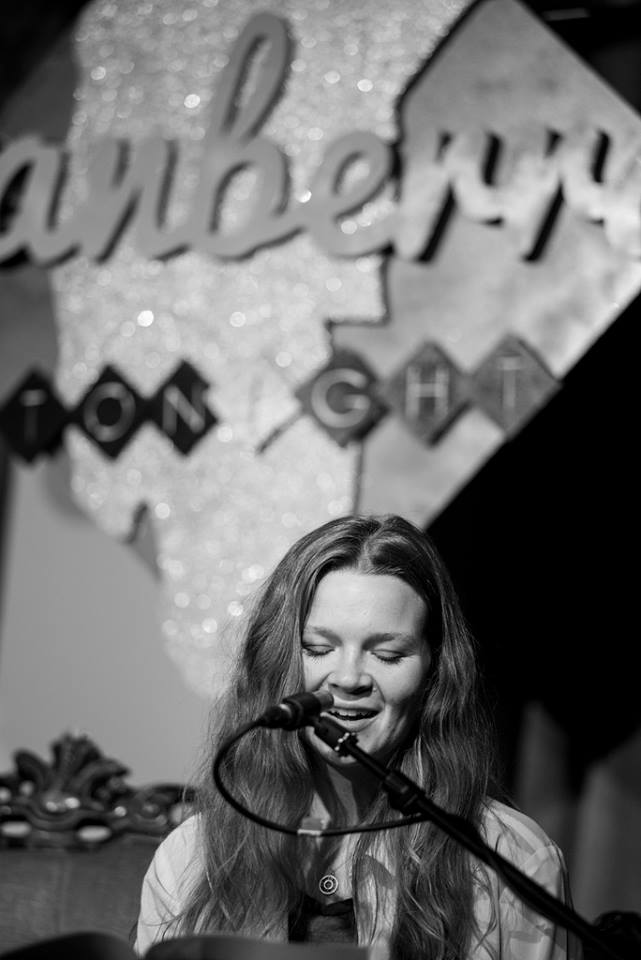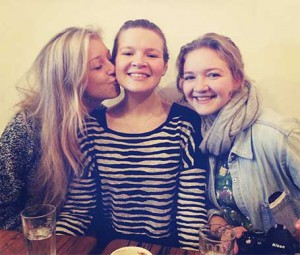Rosanna Stevens: The Right Kind of Blood

Posted on

Rosanna Stevens at In Canberra Tonight.
I’m not going to lie, when I first heard about Rosanna’s Stevens essay ‘The Right Kind of Blood’, I was quite taken aback. ‘Why on earth would anyone want to read about periods? Yuk!’ I thought to myself before taking a deep breath, making a cuppa and settling down to read something that I was sure would make me fidget uncomfortably throughout.
While fidget I did, it was for entirely different reasons, as after reading her piece it became apparent just how silly my initial reaction had been. After all, I get my period. Yep, it’s true. I’m also going to make a crazy assumption here and bet that you, or someone close to you, does too. Yet despite the fact that it’s a part of many women’s lives, there is still this idea that it has to be hidden away; almost as if one should be ashamed of their reproductive system.
Rosanna’s piece is different from other articles that attempt to challenge the current stigma around menstruation, as they usually try to do so by painting periods as something far more fun than they are – something we should celebrate loudly and proudly.
Now most people who get them will agree: periods are not fun. They’re uncomfortable, sometimes very painful, and can come unexpectedly, leading to embarrassing situations (c’mon admit it, we all have one story at least). It is the acknowledgement of this that makes Rosanna’s piece so powerful – she doesn’t try to dilute the realities of menstruation.
While I can’t relate to the ‘yay, periods!’ articles, I can relate to hers, as I’m sure many people will. Rosanna uses real stories from both women and men to describe the everyday experience of menstruation in a relatable and engaging way, in an attempt to bring these realities out into public discussion and change the way periods are seen by society at large.
After reading Rosanna’s essay, I snapped up the opportunity to chat with her about the piece and discuss the reasons why she decided to break away from the stigma and publicly discuss such a taboo topic.
What prompted you to write the piece? Was there an ‘a-ha!’ moment or was it an idea that had been forming for a while?
There was an hilarious ‘a-ha!’ moment, and it came in the form of me sitting on that bus, bleeding into a sock (before you get weirded out go read the essay and then high-five me for my resourcefulness) in stomach-exploding pain. I was sitting there after asking a bus driver and a train officer for painkillers, getting nothing but completely unreal advice, and then feeling ashamed of myself for having my period (and not realising how ashamed I felt until a member of the public came and spoke to me about my period like it was no big deal.)
I was pissed, and on the rest of the bus trip I wrote a Facebook diatribe about how ridiculous it was that I felt so… I’m going to use the word ‘oppressed’. It received hundreds of likes. I couldn’t believe it: people who I hadn’t seen since high school, family members, people who worked in government, who went to fundraisers in gorgeous full-length sequinned numbers, who had babysat me as a noisy kid, business owners and best friends all posted ‘Hell yeah!’ comments of agreement. While I was still on the bus, the Editor in Chief of The Lifted Brow, Sam Cooney, sent me an email saying ‘Turn that comment into a full-length essay and send it to me – it’s fantastic.’ So here we are. I didn’t think I’d ever write about periods before that moment.
Have you experienced any negative reactions to your essay, both during the research/interview process and after publication?

Rosanna with her two sisters.
I haven’t received any negative feedback so far. The only difficult thing during the interview process was that some people wanted their names changed – they’d have a brilliant story, but they’d want to keep their cameo anonymous. That was difficult because the ultimate purpose of the essay is about owning period stories honestly and challenging that strange culture of being ashamed about periods.Yet some of these people I was interviewing still felt shame in the public eye. That really pushed me to include as many of my own embarrassing stories as possible, and wear them.
My family have also been really fantastic in letting me make their lives into stories. I should buy them all flowers – in fact, here’s a photo of my two sisters and I – we all feature in the essay.
Why do you believe periods are such a taboo topic? Do you believe that the stigma around them will change in the near future, and if so, how?
I wish I could say it’s because humans are weird about blood, but we’re not. As I say in the essay, the video game Grand Theft Auto murders, shoots, and rapes (yep, really!) its way into breaking a stack of world records for most popular game, and meanwhile across town a t-shirt with a bleeding vagina on it is taken off the market by American Apparel because its deemed ‘gross’ and ‘man hating’. What?!
I’ve brought my dad, David, into this conversation because it’s way more interesting if we talk about menstruation and include the perspective of a non-menstruator: we all participate in the stigma.
Rosie: Hey Dad.
David: Hey, I was thinking about this while I was reading your essay. I can’t draw a comparison in terms of the pain and discomfort, however in terms of a taboo subject, try approaching your male friends and asking them about masturbation/wanking. I suspect you will probably get a similar response. It simply isn’t discussed, but every guy does it. I guess it all comes under the guise of “self discovery”, and we are taught that self discovery is something that is very personal.
On the other hand, both menstruation and masturbation are facts of life, so the reasons for allocating them to the “taboo” list are fairly odd. This may stem from religion (almost everything does). “What”, may you ask, “does any of this have to do with religion?” Well, historically (and currently), the lives of many, many people around the world are governed by their religious faiths. I am not sure that you really want to bring religion into the discussion, however!
Rosie: It is complicated (and religious), but just because something is taboo doesn’t mean I should accept its status. It’s just as important that women understand wet dreams and why people with penises wake up with hard-ons if they sleep on their stomachs. I want to create an environment where humans can feel comfortable talking about our bodies: that’s when the taboo begins to fall apart. It blows my mind that it’s common to fantasise about shopping for Apple products when workers and the environment suffer so much for these precious slices of technology, but western people can’t talk about the bodies we live in, and experience the world through. Our bodies! We can’t escape our bodies – so why not make having one a nice experience? I want the stigma to change. I think it can. It starts with me.
You mention men’s lack of knowledge about menstruation. I personally have a husband who, despite my trying to show him one for the last few years, still doesn’t know or care to know what a tampon looks like. Do you think it’s important that men have an awareness about periods and what they entail? If yes, how would you go about educating people who don’t experience menstruation themselves and aren’t particularly interested in learning about it?
The essay speaks so much to this really important question. In terms of periods and silence, can’t believe how much I learnt about the people I loved because of their stories – and what I learnt wasn’t only about menstruation, it was about how people I thought I knew reacted to the world. There’s one story early on in the essay, about a friend of mine who was terrified of getting her first period while lying in a hospital bed with a two broken arms and a broken leg. She told me that story sitting in Thai Chang Rai in Belconnen, at a dinner where I was meeting her fiancée for the first time. She’d never shared that experience before, and I knew her when she was going through the whole broken bones saga in early-high school: it had never occurred to me that getting her period would be a fear for her. That story changed the way I thought of her surviving her first semester of high school in a wheelchair: it made me wish I’d been a better friend. That’s what talking about these ‘taboo’ things is about. It’s about being a better partner, or better friend, or parent, or human by knowing someone and all of their experiences and vulnerabilities, and discovering a whole different person you can say you truly know.
It’s important that both menstruators and non-menstruators have an awareness of periods and what they entail: periods are so different for everyone – often other menstruators and women don’t know what periods are like for everyone else who bleeds. And here’s why it’s important to change that awareness and awkwardness: I’ve had endometriosis my whole life. Until last week, my ovaries were covered in cysts so large they were stuck to my uterus. But because I didn’t share my experiences of menstruation with other people (how really unusually painful it is, how heavy it is, how I’ve created a really amazing drug cocktail for the first day of my period that has probably turned my liver to swiss cheese) I never realised that I really was having a worse period than most people and there was a reason for it, until two months ago. I mightn’t be able to have kids, and I came out of surgery with part of an ovary missing: if I’d had a better awareness about periods because I was unafraid to talk about them, I could have been diagnosed at fourteen, and none of this would have happened! The amazing thing is, since I’ve shared my endometriosis adventure, I’ve received a stack of emails from men and women telling me about their experiences with endometriosis (as people with endometriosis, brothers and sisters of people with endometriosis, and partners of people with endometriosis) and these stories helped me prepare for the surgery, and life afterwards. When you throw your voice into a silence, it’s incredible how many people call back.
The first step toward period normalcy is just being okay with it yourself, despite others. It’s hard when you’re surrounded by people who act as though you’re completely disgusting for saying the ‘p’-word, but when I’m feeling really intimidated I think of this incredible poem by International poetry slam champion Dominique Christina. She reminds me that every person who shames me for my period forgets that their mothers carried them cushioned and protected in the blood that they now disown: that is how universal and biologically important periods are. So speak up, I say. Leave your tampon packet on your bedside table. Remind people where they came from.
If your readers could only come away with one thing from your essay, what would you like it to be?
When people think of oppression they think of victims who proclaim unfairness annoyingly, like that parent on Facebook who says things like ‘My mother in law just criticised my table setting and all the children are vomiting and LIFE IS SO HARD WHEN YOUR SON HAS AN ABOVE-AVERAGE READING ABILITY AND NOONE WILL GIVE HIM THE ADVANCED READERS’. We come from this culture where to say things are unfair, or to say ‘I’m oppressed’ is to be weak, and not get on with a job: it’s why we play drinking games to count the number of times Italian soccer players feign injuries dramatically. That parent on Facebook does initially make me want to post a comment like, ‘I’m sorry your children go to school without breakfast or lunch and will perform poorly due to the kind of job you are restricted to because of your class or race!’ but I check that response now. I think that parent is brave to put their feelings out there for everyone to see what real life is like for them. That’s what this essay is about in a lot of ways – saying, ‘oppression happens in all these ways that you can laugh about and relate to and find interesting – because that’s what life is like for someone.’
The most valuable thing a reader can come away with is this: You are not alone living what is real for you. Not ever, whoever you are. I hope this essay gives you the ability to smile at yourself, and talk to your kids and your friends, and share your stories over whichever poison goes down easiest at the end of a long day.


Leave a Reply
You must be logged in to post a comment.